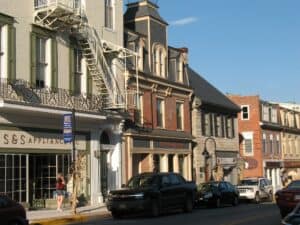
Bedford, PA is the sort of quaint 18th century town that makes a visitor feel like he has stepped back in time.
See if you know this story.
After enthusiastically supporting a hugely expensive war, an angry, combative segment of the American public became outraged at the idea of paying taxes. Complaining of government overreach and darkly warning of the nation’s doom, these self-proclaimed patriots insisted that the government must live within its means, denounced the debt, and refused to pay their taxes, even going so far as to threaten the country’s downfall if they didn’t get their way. And then, in exasperation, George Washington raised a militia and rode out to confront them.
The year was 1794 and the place was western Pennsylvania. The event is known as the Whiskey Rebellion, a violent anti-tax revolt that occurred when a group of farmers on the far side of the Alleghenies became outraged at a tax imposed on them to pay for the Revolutionary War, a war they had enthusiastically supported and which some of them had fought in, a war that, in their minds, was fought to be free of taxes.
The French Are Bad People
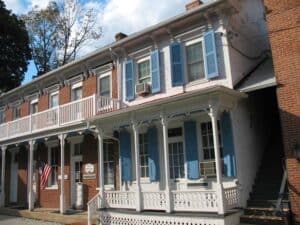
The Colonial Georgian buildings on the village green speak of the quiet rural life of small town America in the late 1700’s.
Bedford, Pennsylvania is the sort of quaint 18th century town that makes a visitor feel like he has stepped back in time. The Colonial Georgian buildings and the quaint village green speak of the quiet rural life of small town America in the late 1700’s when the country was new and the frontier lay a short distance away.
I went to Bedford to take in the guided walking tour of the village and learn something of the town’s history. I was especially interested in learning more about its role in the Whiskey Rebellion because the story seems so relevant now in light of the Tea Party’s anti-tax zeal, their reckless obstinacy, and their purblind conviction that the majority of Americans agree with them.
Bedford’s history is rich, extending all the way back to 1751 when the country was still a part of Great Britain. In 1758 the British army came to Bedford to set up a fort. Fort Bedford was one of a string of forts stretching west across the Alleghenies, designed to provide a quick strike route for the British army to discourage French incursions in the west. In those days the French were the bad guys.
The French had moved south from Canada into the area of modern day Pittsburgh and established Fort Duquesne with the purpose of settling western Pennsylvania. The British were having none of it. The ensuing conflict was called the French and Indian war, pitting British-American colonists against a French and Indian alliance.
As the colonel of a Virginia regiment tasked with driving the French out, a young George Washington may have passed through Bedford for the first time in those years. He would return 36 years later as the president of a new nation on a decidedly different mission.
American Servicemen are Good People
I learned all of this from the tour guide on my walking tour of Bedford, all except the part about George Washington. Oddly, the guide never mentioned the name of Washington, a peculiar omission given Washington’s singular position in the town’s history. He also neglected to mention the Whiskey Rebellion.
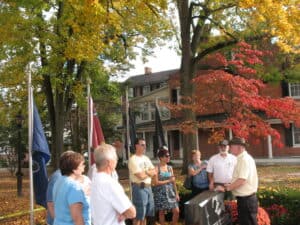
Our tour guide led us to the Vietnam War Memorial and told us all about people in the area who had won the Medal of Honor. But what about the Whiskey Rebellion? I wanted to know.
It’s probably not a good sign when a tour guide begins by telling the group that he has no interest in history, and that you should not ask him questions about historical events outside the topic at hand, as he won’t be able to answer them. What our tour guide lacked in knowledge, however, he made up for in frankness, telling us that he’d probably been hired for his computer skills and that, once hired, he’d read some books about the area’s history and intended to tell us some good stories.
He then led us to the Vietnam War Memorial in the Courthouse Square and proceeded to tell us all about people in the area who had won the Medal of Honor. The memorial was a standard issue block of dark granite with the names of fallen soldiers on it. Our guide found it deeply moving that people he had known had won the Medal of Honor. He waxed poetic on the unheralded heroism of American servicemen for quite some time.
Terrific, I thought, but what about the Whiskey Rebellion?
Whiskey Drinkers are Bad People
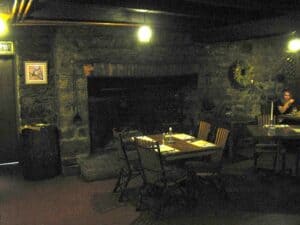
Quite a bit of whiskey was drunk at the Jean Bonnet Tavern in 1794. You can still have a whiskey there today. And you will still be taxed on it.
What our guide wasn’t telling us, either because he found it uninteresting or uncomfortable, was that in 1789, after the ratification of the United States Constitution, the federal government found itself cash strapped. It was in deep debt from the Revolutionary War, $79 million worth, about $23 billion in today’s money. It needed to raise some revenue fast.
The government had been trying to raise money solely from import duties but reached the point where it could no longer draw on that source of revenue alone. So in 1791 Secretary of the Treasury Alexander Hamilton proposed an excise tax on domestically produced spirits, including whiskey, and the congress quickly passed it.
Excise taxes are meant to be punitive, their imposition is meant to discourage unsavory behavior. Today’s ever-increasing cigarette taxes are excise taxes. The imposition of an excise tax is the purest expression of a so-called “nanny state”, a government trying to control the behavior of its citizens by punishing bad behavior. So right from the start our federal government was a nanny state and right from the start a certain breed of American bristled at it.
Tax Resisters are Good People
The whiskey tax was especially burdensome to small western producers who often distilled their excess grain into whiskey to transport it over the mountains, and in the absence of ready cash sometimes used whiskey as a means of exchange. Some former patriots who had fought in the Revolution were aggrieved at what they saw as a violation of the principles they had fought for: taxation without representation.
Their protests didn’t fall on deaf ears. A petition was sent to congress who acted on it, lessening the percentage demanded by the tax. Still, that wasn’t enough for a belligerent minority who saw the government’s willingness to compromise as weakness and sought to exploit it by going even further.
A militant group known as the Mingo Creek Association (sort of a latter day Tea Party) began issuing radical, no compromise demands. They whipped, tarred and feathered tax collectors. They harassed anyone who cooperated with the government including landlords and tavern owners. If you weren’t with them, you were against them, and the longer they got away with it the more emboldened they became.
Liberals are Bad People
Driving down Interstate 76 on my way to Bedford, I saw a billboard with a picture of Ted Kaczynski the Una-Bomber on it. It said, I Still Believe in Global Warming. Do you?
As I travel around the country I am continually amazed at the extent of the partisan bitterness expressed publicly. It’s not enough to say I disagree with you; it has to be accompanied by threats and insults. A trip down the dial of AM radio is a relentless barrage of right wing hate talk, a hand wringing litany of sour victimhood that seeks to lay the blame for everything at the feet of the government and the left.
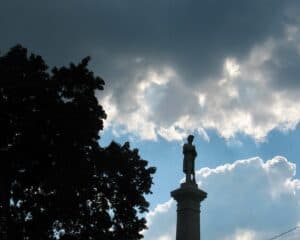
The Civil War monument in Bedford’s village green looks down on a county in which conservatives outnumber liberals 2 to 1.
FOX News, which is often playing in the breakfast rooms of the hotels I stay at, is a 24/7 torrent of right wing propaganda masquerading as a legitimate news source. The hosts are by turns bemused and outraged at the state of the world foisted on them by liberals and “big government”. Their comments are laced with invective. Their interview style is confrontational.
A public that imbibes this to the exclusion of all else soon loses a sense of nuance. Everything becomes black and white, us and them. Those with an opposing view are not reasonable people with a valid perspective but a part of the problem to be belittled and shouted down.
If this is your mindset, if you don’t consider other points of view, before long all you can hear are the thoughts of those who share your opinions. Soon enough you become convinced you are the majority, at which point you are drinking your own Kool Aid.
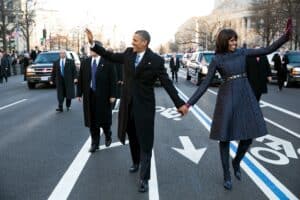
Obama’s second inaugural parade. Shock and confusion for the Tea Party. How could this happen? The majority of voters must’ve been brainwashed by the mainstream media.
So when you are soundly beaten at the polls, you are shocked and bewildered. You begin grasping at the flimsy straws of conspiracy theories. You try to tell yourself that the other side has been brainwashed and manipulated, never considering that you might be the one who’s been the victim of mind control.
This is not the first time this has happened. The radical left made much the same mistake in the 1970’s. The labor union movement of the 1930’s eventually locked itself in its own echo chamber.
Before that, you had the Know-Nothing party of the 1850’s, and way back in the beginning you had the Mingo Creek Association, tarring and feathering tax collectors, burning and beating government officials, taking up arms, all the while convinced they had the support of the majority. Imagine their shock and dismay when the undisputed symbol of our liberty, the father of our nation, the hero they had celebrated and lionized, George Washington, assembled an army to crush them.
Tea Partiers are Good People

George Washington made his headquarters during the Whiskey Rebellion at the Espy House in Bedford. Our tour guide didn’t walk the half block to show us this.
The Espy House in Bedford, PA is arguably the most important historical site in town. It was here in 1794 where Washington made his headquarters during the Whiskey Rebellion. He had come at the head of an army of 12,950 men, a force as large as any army he had commanded during the Revolution, to crush the rebels. He wasn’t messing around.
Angry farmers sympathetic to the rebel cause raised a liberty pole at the John Bonnet Tavern. Liberty poles were symbols of insurrection and resistance. The Jean Bonnet Tavern still stands as an operating tavern and is a great place to get a taste of what life was like at the time of the rebellion. But our tour guide didn’t take us to John Bonnet Tavern. He didn’t walk us the half block it would’ve taken to show us the Espy House. He completely ignored the Whiskey Rebellion in his discussion of the town’s history, even though he had plenty to say about soldiers and armies in general.

Historical marker at the John Bonnet Tavern where angry farmers raised a liberty pole to show their support for the rebels in 1794. Our tour guide never mentioned that.
In Bedford County today Republicans outnumber Democrats 2 to 1. Our tour guide’s refusal to acknowledge the town’s most important historical event spoke volumes.
I went to Bedford at the height of the Tea Party movement in Washington when congressman Ted Cruz and his Tea Party conservatives were refusing to raise the debt limit and threatening to drive the country into insolvency. They staunchly opposed government run health care, decrying its costs and obligations and threatening to do real damage if they didn’t get their way. They were not unlike the angry farmers of western Pennsylvania in 1794 who refused to pay their taxes. And like them, they miscalculated.
George Washington was a Bad Person?
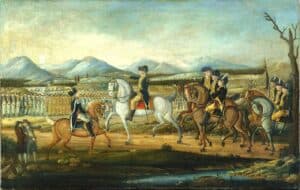
George Washington reviewing troops before their march to suppress the Whiskey Rebellion. This was George Washington as armed tax collector.
The majority of Americans, while worried about the impact of Obamacare, do not feel it’s worth bringing down the economy to repeal it. According to polls, upwards of 80% of Americans thought the Tea Party had overstepped in its government shutdown strategy. More than 200 years earlier the Mingo Creek Association got the same rude awakening.
President Washington felt it was important to demonstrate that the new government had the willingness and ability to suppress violent resistance. Furthermore, he meant to underline that the government was within its rights to impose taxes.
To the shock and dismay of the rebels, the majority of Americans agreed with Washington. When Washington arrived in Bedford to assemble his army to smash them, the rebellion collapsed. The ringleaders were rounded up and arrested. 24 were indicted for high treason. Two were sentenced to be hanged, but Washington wisely pardoned them. The incident eventually faded away.
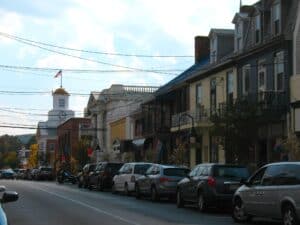
Juliana Street in downtown Bedford, PA, a lovely town with a rich history that can be safely ignored if it inconveniences you.
It’s a fair guess that today most Tea Partiers don’t talk much about the Whiskey Rebellion. It’s an inconvenient part of history that tells a cautionary tale about violent resistance to taxes and the danger of drinking your own Kool Aid. Indeed, to receive the lessons of the Whiskey Rebellion you must be willing to accept a set of facts that may not fit your worldview. You must, so to say, be willing to go there.
My tour guide in Bedford was not, and any Tea Partiers who might have been with us were spared the uncomfortable truth about George Washington. He was an armed tax collector, impatient with the bluster of anti-tax zealots, and quite prepared to silence them.
So Who Exactly Are the Good Guys?

The Juniata River in Bedford, PA. This river is slowly drying up, like public support for the Tea Party. It was once a navigable waterway.
Willful ignorance is a problem in this country. It’s what keeps us angry and divided. It’s what prevents us from getting anything done. If we could all just listen patiently to each side of a story, we might begin to empathize, and then compromise. But that would require some effort.
It’s much easier to give ourselves over to noise and bluster, to savor the wicked deliciousness of blaming others, because it absolves us of responsibility and puts the onus on the other guys. The bad people have to make sacrifices. The bad people have to reform. We can just kick back and drink our whiskey… and our tea… and our Kool Aid, and see what happens.
Previous stop on the odyssey: Charlottesville, VA //
Next stop on the odyssey: New York, NY
Image credits:
All images by Malcolm Logan, except The Whiskey Rebellion illustration, Public domain; Tea Party Rally, Josh Self; Obama inaugural parade, Public domain; Espy House, Canadian2006; George Washington reviewing troops, Public domain

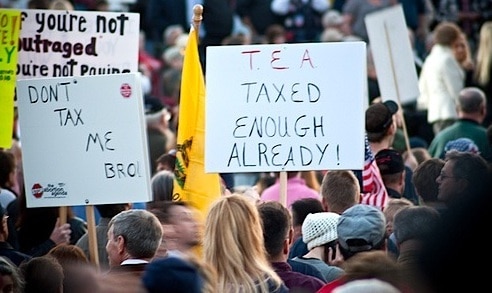

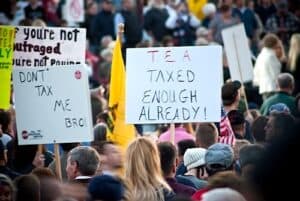

2 comments
Always a good read Malcolm.
Thanks, Ken! See you soon.